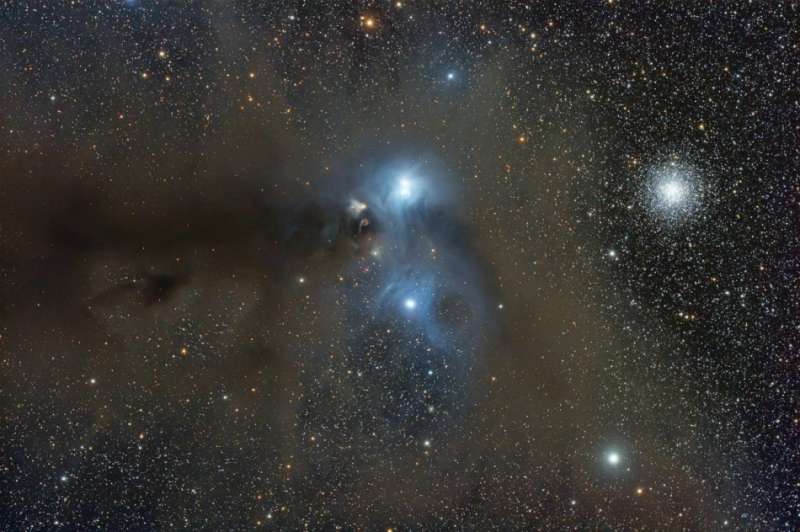Credit & Copyright: Ignacio
Diaz Bobillo
Explanation:
Cosmic dust clouds sprawl across a rich field of stars in
this sweeping telescopic vista
near the northern boundary of
Corona Australis, the Southern Crown.
Less than 500 light-years away the dust clouds
effectively block light from
more distant background stars in the
Milky Way.
The entire frame spans about 2 degrees or over 15 light-years at
the clouds' estimated distance.
Near center is a group
of lovely reflection nebulae cataloged as
NGC 6726, 6727, 6729, and IC 4812.
A characteristic blue color is produced as light
from hot stars is reflected by
the cosmic dust.
The dust also obscures from view stars
in the region
still in the process of formation.
Smaller yellowish nebula NGC 6729 surrounds
young variable star
R
Coronae Australis.
Below it are arcs and loops identified as
Herbig Haro objects
associated with energetic newborn stars.
Magnificent globular star cluster NGC 6723
is at the right.
Though NGC 6723 appears
to be part
of the group,
its ancient stars actually lie nearly 30,000 light-years away,
far beyond the young stars of the Corona Australis dust clouds.
1999 2000 2001 2002 2003 2004 2005 2006 2007 2008 2009 2010 2011 2012 2013 2014 2015 2016 2017 2018 2019 2020 2021 2022 2023 2024 2025 |
Yanvar' Fevral' Mart Aprel' Mai Iyun' Iyul' Avgust Sentyabr' Oktyabr' Noyabr' Dekabr' |
NASA Web Site Statements, Warnings, and Disclaimers
NASA Official: Jay Norris. Specific rights apply.
A service of: LHEA at NASA / GSFC
& Michigan Tech. U.
|
Publikacii s klyuchevymi slovami:
star formation - dust - stars - Corona Australis - globular cluster - Yuzhnaya Korona - pyl' - Tumannosti mezhzvezdnye - zvezdoobrazovanie
Publikacii so slovami: star formation - dust - stars - Corona Australis - globular cluster - Yuzhnaya Korona - pyl' - Tumannosti mezhzvezdnye - zvezdoobrazovanie | |
Sm. takzhe:
Vse publikacii na tu zhe temu >> | |
